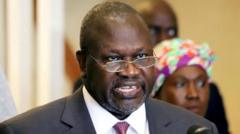South Sudan is on the brink of instability as First Vice-President Riek Machar is reportedly under house arrest, with his party denouncing the government’s actions against him.
South Sudan's Machar Placed Under House Arrest Amid Rising Tensions

South Sudan's Machar Placed Under House Arrest Amid Rising Tensions
First Vice-President's detention raises fears of renewed civil conflict in the world's youngest nation.
Riek Machar, South Sudan's First Vice-President and a long-established rival of President Salva Kiir, is facing grave political turmoil as he has been placed under house arrest, according to statements from his party, the Sudan People's Liberation Movement In Opposition (SPLM/IO). This development follows a recent escalation in conflict between the two leaders, who previously agreed to a peace deal aimed at ending a five-year civil war that claimed around 400,000 lives.
On Wednesday, top security officials, led by the defense minister, reportedly stormed Machar's residence in Juba, disarming his bodyguards and trying to detain him outright. SPLM/IO's foreign relations committee chair, Reath Muoch Tang, described the situation as a "blatant violation" of both the constitution and the Revitalized Peace Agreement, claiming Machar was arrested without clear charges. His wife, Angelina Teny, the interior minister, was reportedly detained alongside him.
Concerns over the stability of South Sudan have been heightened by escalating ethnic tensions and sporadic violence. The United Nations warned that the country risks losing the "hard-won gains of the past seven years" if it relapses into civil war. Recent clashes between forces loyal to Machar and Kiir in the northern town of Nasir have only added to these fears.
The geopolitical implications of this crisis are significant, with both the British and US embassies reducing diplomatic staff and urging citizen evacuation, while Norway and Germany have ceased operations in Juba. The UN mission in South Sudan has cautioned that any violations of the 2018 peace deal could trigger widespread conflict in the nation and destabilize the region.
As tensions continue to rise, both South Sudan and the international community are watching closely, fearing a return to the violent upheaval that marked the country's early years of independence.



















